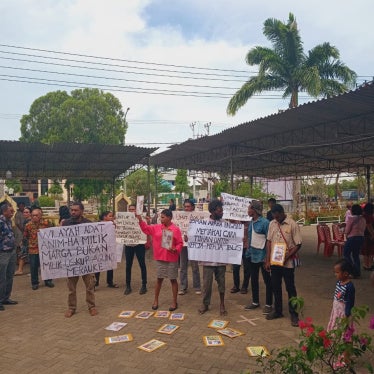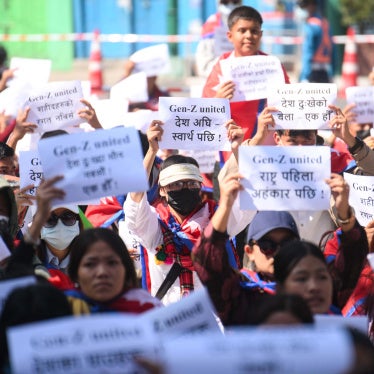Indonesia may be the next front in the U.S. war against terrorism in Southeast Asia. But terrorism is not at the root of Indonesia's most urgent troubles. And some U.S. proposals for fighting the war may worsen the problems they are meant to correct.
The Bush administration is asking Congress to provide $8million to train and equip a "domestic peacekeeping force" in Indonesia to suppress sectarian violence. The State Department argues that "rapid restoration of order will reduce tensions and weaken extremist groups, thus serving counter-terrorism goals in Indonesia and beyond." The funding request is buried in a special foreign aid bill due to be voted on as early as today.
How would such a force function? Would it promote military reform? Or would it strengthen the power of an increasingly confident and assertive army? The State Department says it would screen recruits to keep out human rights abusers and the unit's performance would be monitored by U.S. personnel. Yet the U.S. track record for trying to change the Indonesian military culture is spotty at best, and prosecutions of abusers are rare.
During my recent trip to Jakarta, violence exploded again in the province of Maluku. Three years of Muslim-Christian tensions, resulting in thousands of deaths, had subsided and a peace deal was signed in February. But the activities of a small group of Christian separatists combined with the agitation of a radical Muslim militia group, the Laskar Jihad, sparked renewed violence. Christian churches and homes were burned, civilian deaths mounted and gunmen carrying M-16s raised suspicions that Indonesian soldiers were involved.
The roots of the conflict in Maluku are complex, including political rivalries and economic tensions and charges of provocation by outside groups. The U.S. suspects that Laskar Jihad has links to Al Qaeda, but the causes of the violence are clearly domestic.
The Indonesian security forces have been slow to respond to the violence. The problem is not a lack of training and equipment; it's a lack of political will and the highly political role of the army.
None of the diplomats, business people or nongovernmental organizations I spoke with in Jakarta could imagine how a U.S.-trained force--outfitted with M-16s, helicopters, crowd control equipment and other hardware--would work in a hot spot such as Maluku or in Aceh, site of a secessionist war.
Above all, there is little faith in Indonesia's weak civilian institutions to exercise the kind of control needed to prevent a peacekeeping unit from becoming another abusive force like the army's special forces or the mobile police brigades. So why is the U.S. promoting this idea?
For months, senior Bush administration officials have urged President Megawati Sukarnoputri to crack down on suspected terrorist links. The latest initiative, combined with a second $8-million funding request to set up a counter-terrorism unit, is part of the same strategy.
The Pentagon is eager to reestablish relations with its Indonesian counterpart. Military cooperation with Indonesia was restricted by the Clinton administration after a rampage by army-sponsored militias in East Timor in 1999. Bush has lifted many restrictions, resuming high-level military contacts and commercial sales of nonlethal arms.
However, Congress made specific training programs and arms sales conditional in last year's foreign aid bill, requiring steps toward greater accountability for human rights abuses and civilian control of the military. The counter-terrorism agenda is being used as an excuse for subverting these conditions.
U.S. support for changing the role of the military is critical for the country's long-term democratic transition, but aid should be given only when it contributes to reform. This includes removing impunity for military personnel, putting security forces under effective civilian control and ending their shadowy role supporting militia groups and stimulating local and regional conflicts.
There is no quick fix in dealing with terrorism in Southeast Asia. A U.S.-funded "peacekeeping force" would send the wrong signal to those promoting basic reform and, worse, there is little prospect it would help keep the peace.
Mike Jendrzejczyk is Washington D.C. Director of Human Rights Watch's Asia Division.








